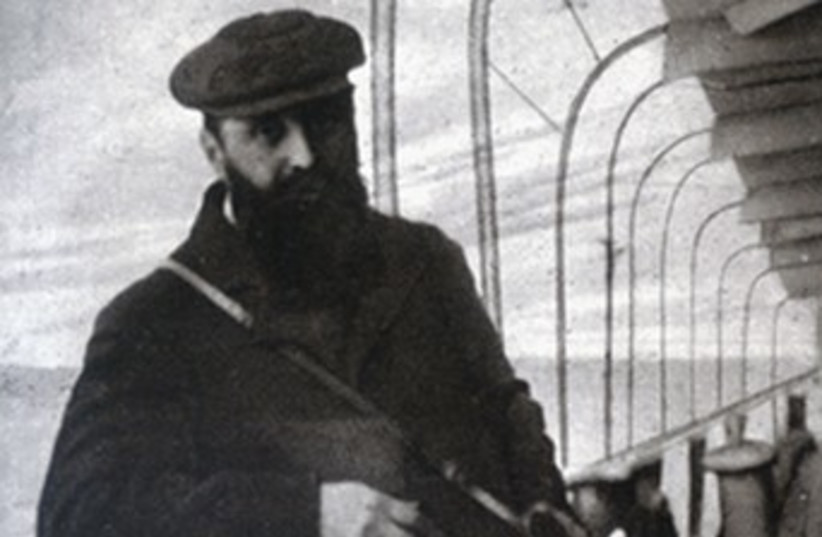As Israel celebrates its 74th birthday, let’s hope our leaders are already planning the 75th Diamond Jubilee Celebration. With limited lifespans, humans call 60th anniversaries, Diamond Jubilees. Playing a longer game, institutions, countries, and especially Jews, the forever-people on our forever-land, can shine on the 75th.
Spearheaded by Israel’s outstanding president, Isaac Herzog, the 75th should salute the ways Israel has dazzled since 1948. We need a nationwide brainstorming, planning festivities with Ivy League-level substance, Hollywood-level showmanship, and Swiss efficiency. The kickoff should be August 29, the 125th anniversary of Theodor Herzl’s first Zionist Congress.
Another wave of excitement should surround the 75th anniversary of the UN’s vote legitimizing a Jewish State on November 29, culminating next Independence Day, April 25.
The Zionist Congress anniversary should start a year-long, worldwide, celebration of Zionism. From the August anniversary in Basel, through the High Holy Days, every Jew should learn something about Herzl and read one Zionist text, while participating in a Zionist Salon – conversations about what Zionism means today, convened throughout the year, for Jews and non-Jews.
Here’s an opportunity to appreciate Herzl’s “Leap of Hope,” while tracking the Jews’ redemptive arc thanks to Zionism – from the broken-down yid to the proud New Jew, from homelessness to home, from weakness to strength, from persecution to self-rule, from mostly living in autocracies to running a Jewish democracy, from despair to hope.

We’re shifting from Political Zionism to Identity Zionism. We still echo John Kennedy, asking “what can we do for our country?”. But we also should ask “what can our country do for us” – ideologically, existentially, Jewishly – in Israel and abroad.
The November 29 conversation should emphasize the Jewish people’s rights to live in their homeland, which the UN affirmed in 1947. Start with the Bible, and Israel’s centrality to Jews’ self-definition as a people and to Judaism’s values and rituals. Continue with the historical ties – the Jews’ 3,500-year-old love story for their land.
And, deepening the Zionist conversation, without being defensive, we should explain what having a homeland means for those living elsewhere, along with the power of home, for those who returned.
Never fear, when discussing Jewish nationalism, to address Palestinian nationalism too. Acknowledge the complexities of two peoples in love with the same land, the 1947 compromise, and Arab extremists’ categorical rejection of any compromise, of any Jewish presence, which many Palestinians perpetuate.
Especially in the Diaspora, where Passover is more celebrated than Israel’s Independence Day, next year’s Seders should hype the upcoming Diamond Jubilee. Zionized Haggadot or special supplements, should incorporate Zionist readings and fun facts, celebrating Jews’ modern Exodus from Jew-hating Pharaohs and from the Mitzrayim (Egypt), or meitzarim, (straits) of powerlessness. Every Seder participant should answer two questions: “What does Israel mean to me?” and “what can it mean to me – and to us?”.
By spring, Israel should mount special exhibits illustrating Israel’s history since 1948, which no museum currently offers. Multiple countdowns should occur on many different media, identifying Israel’s 75 best songs, foods, innovations, books, thinkers, leaders, community organizers and NGOs.
Generate less conventional lists too. Popular contests should propose the 75 best “Teddies” – Herzl-style ideas for the future; the 75 wittiest “Goldie’s” – Golda Meir-style one-liners from yesterday or today describing Israel; and the 75 Biggest “Begins” – Menachem Begin-style epic, history-changing, moments.
Planners should piggyback whenever possible on existing initiatives. Short clips retelling Israel’s history, perhaps counting down to May 1948, can build on videos produced by OpenDor media and others. Debates about Israel’s future can build on Michael Oren’s 2048 project, which imagines what Israel will look like at its centennial.
After all this intellectual and ideological exploration, the 75th anniversary should be more about fun than fundamentals. The state should go all-out, hosting parades, festivals, international conferences and exhibitions.
The president should issue Diamond Jubilee Medals to leaders in various fields, with dinners at symbolic sites throughout Israel, inviting winners to bring five young colleagues deserving certificates of merit, as tomorrow’s superstars.
Special international delegations should be welcomed with the blue-and-white carpet of warmth and inspiration. And don’t forget merchandising: 75th-anniversary swag, from commemorative books and an Independence Day Haggadah, to baseball caps, T-shirts, coins, medals, posters and banners.
Meanwhile, in every Jewish and pro-Israel home, school and religious institution, everyone should eat ice cream for breakfast that morning, making the day sweet and memorable. That tradition would honor my friend “Savta” Shula Sofer, and many others, who never ate ice cream in exile (in Djerba, she explains, it wasn’t kosher).
While indulging, we can try imagining the elevating, liberating, and normalizing feeling she and other immigrants had when they could finally taste the thrill of coming home to a land that welcomed them, where they and their families could flourish free from Jew-hatred.
Each Hebrew letter represents a specific number, so many words equal 75. One such word, Lamah (why) captures that first Zionist phase, explaining why we needed, and still need, a Jewish state. Yehudim (Jews) suits the second phase, defining Jews’ right to this particular Promised Land. Finally, the phrase Bayom Hahu (on that day) evokes the birthday joy for this miracle still-in-the-making.
This mix of substance and silliness should achieve two goals. Those abroad should realize: “I don’t live in Israel, but Israel lives in me.” Those lucky enough to live in Israel should realize, “I didn’t get to establish Israel, but we get to perfect it – and enjoy it.”
The writer is a distinguished scholar of North American history at McGill University. His book Never Alone: Prison, Politics and My People, coauthored with Natan Sharansky, was published by PublicAffairs of Hachette.
